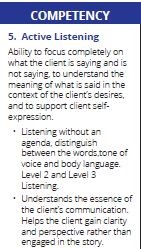In the first post we had a challenge – how did you do with it? What did you learn?!–more–>
Now let’s get specific: An excellent starting point for coaches to develop the language of success is to understand three principals and begin practicing language that creates success.
1. Speak in Specific and Accurate terms – Statements that delete, distort, or generalize limit understanding and positive, proactive planning.
Without a clear understanding of the circumstances, clear thinking and decision-making are less likely. Consider this example: A client states that they can’t do it. This deletes information – the reason; distorts – does not look at how it could be done; generalizes – can’t is a broad statement.
The coach then asks questions: What is preventing you? What are the possibilities for making it work? How will you move past the barriers to make it happen?
2. Keep it Positive – The path of least resistance is often negative and human beings have a tendency toward it.
Think about the difference between these: debt-free versus financially free; no stress versus relaxed; not work so many hours versus balanced schedule. Now consider how it feels or sounds to say the different possibilities.
When a client uses negative language, the coach asks questions to move the client toward positive language: If you are debt-free, what does that mean? If you are not stressed, what are you? If you are not working too much, what is your schedule?
3. Talk about what you Do Want – When people communicate, only seven percent of the words are heard and understood, so negative statements tend to reinforce the negative.
Read this out loud to yourself: The horse did not jump the fence and run over three children. Now, what did your brain process? Most people hear ‘a horse jumping over a fence and running over three children.’ The human brain does not process in the negative, so the ‘did not’ or ‘don’t’ gets lost.
As a coach, you realize the impact of these messages: “Don’t forget” often = forget. So the coach asks, “If you don’t forget, what are you doing?” “Remembering.” When the client says they do not want to be overweight or that they want to lose weight, the coach asks, “what is your ideal weight or size?” The goal is what they do want.
How will you use this information?




